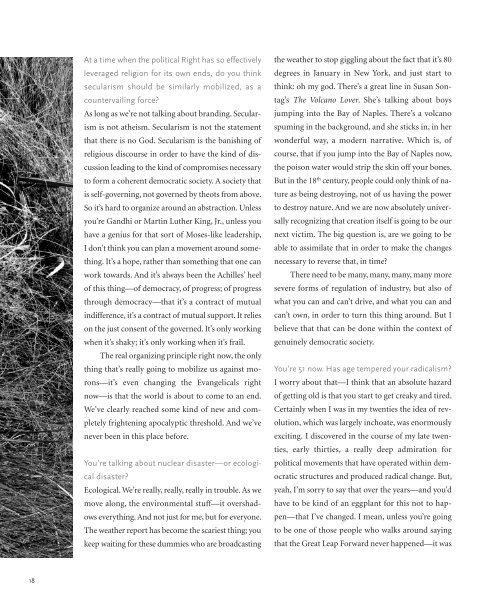the perfectionist: an interview with playwright tony kushner
the perfectionist: an interview with playwright tony kushner
the perfectionist: an interview with playwright tony kushner
Create successful ePaper yourself
Turn your PDF publications into a flip-book with our unique Google optimized e-Paper software.
18<br />
At a time when <strong>the</strong> political Right has so effectively<br />
leveraged religion for its own ends, do you think<br />
secularism should be similarly mobilized, as a<br />
countervailing force?<br />
As long as we’re not talking about br<strong>an</strong>ding. Secularism<br />
is not a<strong>the</strong>ism. Secularism is not <strong>the</strong> statement<br />
that <strong>the</strong>re is no God. Secularism is <strong>the</strong> b<strong>an</strong>ishing of<br />
religious discourse in order to have <strong>the</strong> kind of discussion<br />
leading to <strong>the</strong> kind of compromises necessary<br />
to form a coherent democratic society. A society that<br />
is self-governing, not governed by <strong>the</strong>ots from above.<br />
So it’s hard to org<strong>an</strong>ize around <strong>an</strong> abstraction. Unless<br />
you’re G<strong>an</strong>dhi or Martin Lu<strong>the</strong>r King, Jr., unless you<br />
have a genius for that sort of Moses-like leadership,<br />
I don’t think you c<strong>an</strong> pl<strong>an</strong> a movement around something.<br />
It’s a hope, ra<strong>the</strong>r th<strong>an</strong> something that one c<strong>an</strong><br />
work towards. And it’s always been <strong>the</strong> Achilles’ heel<br />
of this thing—of democracy, of progress; of progress<br />
through democracy—that it’s a contract of mutual<br />
indifference, it’s a contract of mutual support. It relies<br />
on <strong>the</strong> just consent of <strong>the</strong> governed. It’s only working<br />
when it’s shaky; it’s only working when it’s frail.<br />
The real org<strong>an</strong>izing principle right now, <strong>the</strong> only<br />
thing that’s really going to mobilize us against morons—it’s<br />
even ch<strong>an</strong>ging <strong>the</strong> Ev<strong>an</strong>gelicals right<br />
now—is that <strong>the</strong> world is about to come to <strong>an</strong> end.<br />
We’ve clearly reached some kind of new <strong>an</strong>d completely<br />
frightening apocalyptic threshold. And we’ve<br />
never been in this place before.<br />
You’re talking about nuclear disaster—or ecological<br />
disaster?<br />
Ecological. We’re really, really, really in trouble. As we<br />
move along, <strong>the</strong> environmental stuff—it overshadows<br />
everything. And not just for me, but for everyone.<br />
The wea<strong>the</strong>r report has become <strong>the</strong> scariest thing; you<br />
keep waiting for <strong>the</strong>se dummies who are broadcasting<br />
<strong>the</strong> wea<strong>the</strong>r to stop giggling about <strong>the</strong> fact that it’s 80<br />
degrees in J<strong>an</strong>uary in New York, <strong>an</strong>d just start to<br />
think: oh my god. There’s a great line in Sus<strong>an</strong> Sontag’s<br />
The Volc<strong>an</strong>o Lover. She’s talking about boys<br />
jumping into <strong>the</strong> Bay of Naples. There’s a volc<strong>an</strong>o<br />
spuming in <strong>the</strong> background, <strong>an</strong>d she sticks in, in her<br />
wonderful way, a modern narrative. Which is, of<br />
course, that if you jump into <strong>the</strong> Bay of Naples now,<br />
<strong>the</strong> poison water would strip <strong>the</strong> skin off your bones.<br />
But in <strong>the</strong> 18th century, people could only think of nature<br />
as being destroying, not of us having <strong>the</strong> power<br />
to destroy nature. And we are now absolutely universally<br />
recognizing that creation itself is going to be our<br />
next victim. The big question is, are we going to be<br />
able to assimilate that in order to make <strong>the</strong> ch<strong>an</strong>ges<br />
necessary to reverse that, in time?<br />
There need to be m<strong>an</strong>y, m<strong>an</strong>y, m<strong>an</strong>y, m<strong>an</strong>y more<br />
severe forms of regulation of industry, but also of<br />
what you c<strong>an</strong> <strong>an</strong>d c<strong>an</strong>’t drive, <strong>an</strong>d what you c<strong>an</strong> <strong>an</strong>d<br />
c<strong>an</strong>’t own, in order to turn this thing around. But I<br />
believe that that c<strong>an</strong> be done <strong>with</strong>in <strong>the</strong> context of<br />
genuinely democratic society.<br />
You’re 51 now. Has age tempered your radicalism?<br />
I worry about that—I think that <strong>an</strong> absolute hazard<br />
of getting old is that you start to get creaky <strong>an</strong>d tired.<br />
Certainly when I was in my twenties <strong>the</strong> idea of revolution,<br />
which was largely inchoate, was enormously<br />
exciting. I discovered in <strong>the</strong> course of my late twenties,<br />
early thirties, a really deep admiration for<br />
political movements that have operated <strong>with</strong>in democratic<br />
structures <strong>an</strong>d produced radical ch<strong>an</strong>ge. But,<br />
yeah, I’m sorry to say that over <strong>the</strong> years—<strong>an</strong>d you’d<br />
have to be kind of <strong>an</strong> eggpl<strong>an</strong>t for this not to happen—that<br />
I’ve ch<strong>an</strong>ged. I me<strong>an</strong>, unless you’re going<br />
to be one of those people who walks around saying<br />
that <strong>the</strong> Great Leap Forward never happened—it was


